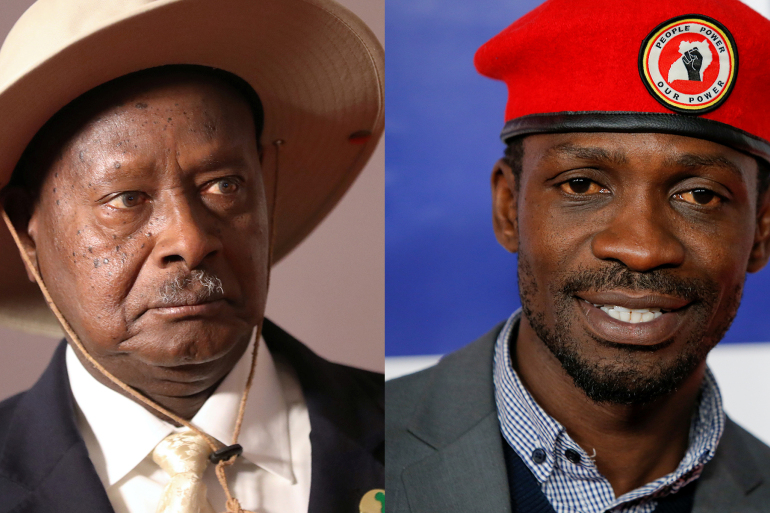More News
As Museveni Dips Into More Ignominy

Results from Thursday’s presidential election in Uganda show President Yoweri Museveni sweeping the polls. The lead by the president was, however, no cheer to most people, especially victims of his 35-year iron grip on his nation.
A nation once enriched by the flavour of Africa’s rich tradition, Uganda has been worsened by the brutal reigns of some of Africa’s most repugnant political leaders. From Milton Obote to Idi Amin and now Museveni, the territory once sought out as a settlement for the Jews by the British has been plagued by evil rule.
After what his soldiers did to the wife of his main challenger just before the election, what was left of Museveni’s little credibility among reasonable men became fully an odious legacy.
It is surprising to note that the this 76 year old man was once celebrated as the torch bearer of an African renaissance. Not anymore.
Robert Ssentamu, popularly known as Bobi Wine, the candidate of the National Unity Platform was just four years old when Museveni shot himself to power with the sack of the Tito Okelo’s hapless military regime.
Bobi Wine’s wife, Barbara Ssentamu who soldiers beat and stripped in public in the presence of her teenage son earlier this week, was herself four months old when Museveni came to power.
The brutalization of Bobi Wine’s wife and the naked aggression for power after 35 years in office as maximum ruler brings to question the way Africans interrogate political office applicants.
In the period he has been president and maximum ruler, Museveni has had six prime ministers and four vice-presidents including the incumbent, Edward Ssekandi who has been in office since 2011.
Museveni’s ascension to power came after he had understudied some of the great revolutionary front-runners of the sixties and seventies. Among them were Frantz Fanon and Walter Rodney.
However, whatever merit that was in his learning evaporated after about six years in power as he started tampering with the constitution.
Yes, the coup that removed Milton Obote from power for the second time in 1985 was partly influenced by the pressure that Museveni’s National Resistance Army brought on the country. If his problem was with Obote, he would have stopped the insurgency.
There was also gist here and there that Chief MKO Abiola funded him.
However, as he consolidated in power, changes began to come as the democratic space began to shrink. After spending ten years in office as a military dictator, he allowed election which he made himself win in 1996.
He again made himself win a second five-year term in 2011 and has since 1996 won almost unchallenged five five-year terms. If he wins as he has programmed himself to, he would be grabbing to himself a sixth term besides the ten-year reign as a military dictator.
In the period nothing substantial has changed at least in the reckoning of the international community within Uganda.
But in the neighbourhood, Museveni as a revolutionary kingpin has helped to change the political topography of his neighbourhood. Few know of his underhand role in the emergence of Paul Kagame as Rwanda leader.
Kagame initially served Museveni’s head of military intelligence before he was embedded into the Rwanda refugees that helped to stem the Rwanda genocide. Museveni was reportedly, also, a facilitator to the political changes in Democratic Republic of the Congo and reportedly helped to end the reign of Mobutu Seseko.
Museveni is today the cynosure of all eyes because of the good irritation from Bob Wine.
However, there are many other African leaders also doing nothing but occupying space through brutal enforcement of regime security polices over their nations.
On Nigeria’s eastern border is Paul Biya who came to power in 1982. Before then, he was appointed prime minister in 1975.
While Museveni is considered a betrayal of the collective hope of Africa, Biya’s trajectory is even more of a personal betrayal. He was prime minister under Ahamdu Ahidjo who surprisingly resigned in 1982 leaving Biya in charge. Between 1982 and 1984 in an unusual political coup against a Fulani man, Biya succeeded in removing vestiges of Ahidjo and ensured that the old man died a frustrated man in exile in Senegal.
When your correspondent visited Yaounde, the Cameroonian capital ten years ago, he was shocked to see that the official portrait of Biya showed a very young man.
On enquiry it was revealed that the current pictures of the man were not officially displayed in order for the citizenry not to know how old their president is! Today, the gist is that at almost ninety, that he is unable to carry himself.
However, Biya surprisingly does not hold the record of being Africa’s longest surviving ruler in office. That record is held by Nguema Mbasago who has been president of Equatorial Guinea since 1979.
Not one of these dictators Museveni, Biya or Mbasago can even be said to have changed the narrative in his country. The exception may be for Paul Kagame.
However, we have learnt from the example of Jerry Rawlings who after establishing his country on the part of democratic expression withdrew. Regrettably, Museveni with his conduct against Bob Wine’s wife who can even fit his grand-daughter has shamed all the claim of being a strong man.
His time is up. Whether he wins the election for himself or not his credibility diminishes everyday he hangs on to power!
It is alleged that up to 50 persons may have died during the campaigns ahead of this election.
Such men like Museveni do not heed the creed of Dr. Goodluck Jonathan that no election is worth the blood of an individual. Remarkably as Museveni’s name was shrinking into ignominy, Jonathan’s name was yesterday being celebrated after another award as Africa’s Peace and Security Leader, 2020. It was an award from the London based African Leadership Magazine!
Send Us A Press Statement Advertise With Us Contact Us
And For More Nigerian News Visit GWG.NG

